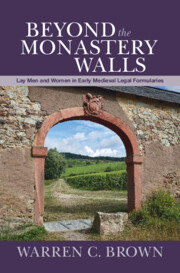Book contents
- Beyond the Monastery Walls
- Beyond the Monastery Walls
- Copyright page
- Dedication
- Contents
- Figures
- Acknowledgments
- Abbreviations
- Part I The Gate
- Part II The Laity
- 4 Laypeople and Documents
- 5 Laypeople and Property
- 6 Family
- 7 Conflict and Justice
- 8 Power, Personal Relationships, and Letters
- 9 Freedom and Unfreedom
- 10 Conclusions
- Bibliography
- Manuscript Index
- Main Index
7 - Conflict and Justice
from Part II - The Laity
Published online by Cambridge University Press: 09 December 2022
- Beyond the Monastery Walls
- Beyond the Monastery Walls
- Copyright page
- Dedication
- Contents
- Figures
- Acknowledgments
- Abbreviations
- Part I The Gate
- Part II The Laity
- 4 Laypeople and Documents
- 5 Laypeople and Property
- 6 Family
- 7 Conflict and Justice
- 8 Power, Personal Relationships, and Letters
- 9 Freedom and Unfreedom
- 10 Conclusions
- Bibliography
- Manuscript Index
- Main Index
Summary
Many of the formulas dealing with conflict highlight formal courts and judicial processes. Others represent extrajudicial settlements. In this respect they match, though in an entirely lay context, the picture of early medieval dispute settlement visible in other sources. They make particularly clear, however, that judicial and extrajudicial settlements were points on a complex and intertwined continuum. They also tell us that people – both litigants and authority figures – could manipulate and abuse judicial processes for their own purposes. The formulas are particularly interested in interpersonal violence. We find men assaulting each other on the road and taking each other’s property. We find men killing others for a variety of reasons. Those who committed homicide not only negotiated the payment of the required blood price, but actually paid it – and had their payment recorded in a security that protected them from any further trouble. Women too are accused of homicide, sometimes by poison or sorcery but sometimes by more active means. In the end, the formulas suggest that a culture assuming a right to personal violence was alive and well in the Carolingian period, despite strenuous efforts especially by Charlemagne and Louis the Pious to regulate it.
- Type
- Chapter
- Information
- Beyond the Monastery WallsLay Men and Women in Early Medieval Legal Formularies, pp. 216 - 251Publisher: Cambridge University PressPrint publication year: 2022

